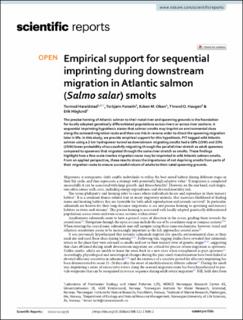| dc.contributor.author | Haraldstad, Tormod | |
| dc.contributor.author | Forseth, Torbjørn | |
| dc.contributor.author | Olsen, Esben M. | |
| dc.contributor.author | Haugen, Thrond O. | |
| dc.contributor.author | Höglund, Erik | |
| dc.date.accessioned | 2022-09-21T12:04:36Z | |
| dc.date.available | 2022-09-21T12:04:36Z | |
| dc.date.created | 2022-08-23T13:51:57Z | |
| dc.date.issued | 2022 | |
| dc.identifier.citation | Scientific Reports. 2022, 12, 13736. | en_US |
| dc.identifier.issn | 2045-2322 | |
| dc.identifier.uri | https://hdl.handle.net/11250/3020215 | |
| dc.description.abstract | The precise homing of Atlantic salmon to their natal river and spawning grounds is the foundation for locally adapted genetically differentiated populations across rivers or across river sections. A sequential imprinting hypothesis states that salmon smolts may imprint on environmental clues along the outward migration route and then use this in reverse order to direct the spawning migration later in life. In this study, we provide empirical support for this hypothesis. PIT-tagged wild Atlantic salmon using a 2 km hydropower tunnel as downstream migrating smolts had a 18% (1SW) and 23% (2SW) lower probability of successfully migrating through the parallel river stretch as adult spawners compared to spawners that migrated through the same river stretch as smolts. These findings highlight how a fine-scale riverine migration route may be imprinted in wild Atlantic salmon smolts. From an applied perspective, these results stress the importance of not depriving smolts from parts of their migration route to ensure successful return of adults to their natal spawning grounds. | en_US |
| dc.language.iso | eng | en_US |
| dc.publisher | Nature | en_US |
| dc.rights | Navngivelse 4.0 Internasjonal | * |
| dc.rights.uri | http://creativecommons.org/licenses/by/4.0/deed.no | * |
| dc.title | Empirical support for sequential imprinting during downstream migration in Atlantic salmon (Salmo salar) smolts | en_US |
| dc.type | Peer reviewed | en_US |
| dc.type | Journal article | en_US |
| dc.description.version | publishedVersion | en_US |
| dc.rights.holder | © 2022 The Authors | en_US |
| dc.source.pagenumber | 8 | en_US |
| dc.source.volume | 12 | en_US |
| dc.source.journal | Scientific Reports | en_US |
| dc.identifier.doi | 10.1038/s41598-022-17690-2 | |
| dc.identifier.cristin | 2045384 | |
| dc.source.articlenumber | 13736 | en_US |
| cristin.ispublished | true | |
| cristin.fulltext | original | |
| cristin.qualitycode | 1 | |

